Robert Gorter’s parents
Robert Gorter’s parents left with Robert to move from Hoorn to Haarlem (Aerdenhout and later Heemstede, two upper middle class suburban towns with mainly large and secluded villas. Robert’s father was appointed as “hoofdcommisaris van politie” (head of the municipal police) in Haarlem. His father fulfilled this function until he retired at age 63.
The childhood of Robert was in many ways seemingly uneventful for the outer world. He grew up in a very sheltered environment right after the end of the Second World War (WWII). The Netherlands had greatly suffered under the Nazi occupation (1940 – 1945) and Robert’s parents had been in the resistance since the spring of 1941.
In May 1940, Robert’s father had been head of the police in Leeuwarden, the capital of Friesland, one of the most northern provinces of the Netherlands, and had now been appointed as head of the police in Hoorn by the Dutch government (Queen Wilhelmina) on the first day of the invasion of the Netherlands by the Germans (the whole invasion took only 5 days, as the Dutch capitulated when Rotterdam was completely bombed in one night and the Germans threatened to do the same with the capital of Amsterdam). Hoorn was a strategic city in the Northern part of the Netherlands (West Friesland) und the Dutch government’s effort was to secure the Northern part of Holland. The move from Leeuwarden to Hoorn was not uneventful. With a truck with all their furniture, the parents moved over the more than 30km-long “Afsluitdam,” a dam connecting Friesland with Noord-Holland, to Hoorn but were several times attacked by German war planes. Bullets went through the roof of the moving truck at several incidents and still, some of their furniture, which surfaced again after the war in 1945, had traces of damage done by the German bullets.
One day, spring or summer 1941, Robert’s father (Willem Jacob Gorter 1903 – 1996) found out that the Germans would start arresting Dutch Jewish citizens and deport them to concentration camps. The Germans did not want to start in a large city like Amsterdam but rather in a smaller town, “to practise”, as it were. Therefore, they choose Hoorn and there was a list of names and addresses of almost 800 Jewish families and individuals who would be arrested at their homes very early morning one day.
Right after sunset, Willem Jacob Gorter and a befriended policeman, visited all Jewish families they could, and warned them that there would be a “razzia” and that they should leave immediately, as otherwise, they would be captured and transported to concentration camps in Germany or Poland.
When the Germans started their razzia, it became quickly clear that almost all Jews had fled Hoorn in the middle of the night. It took them a few hours to find out that Willem Jacob Gorter must have been the leak. He would be executed right away. Thus, within minutes, Willem Jacob Gorter and his wife Jansje Dingena Gorter-Dik, left Hoorn with nothing more than a bag with some essentials, and their only daughter at that time, Rita Gorter, 7 years of age. By doing so, they knew that they lost all their earthly belongings to the Germans. The Germans confiscated all they had, including the house and a huge art collection. Nazies were crazy about art and would steal any objects of art from their occupied territories.
Robert Gorter’s parents were very active in the resistance (underground or partisans) till the end of the war. This meant that they were always living in hiding; usually not entering the streets till after sunset and before sunrise; meeting other Dutch men and women in the resistance. They disrupted many German army and Gestapo activities and saved many more lives of Jews, communists, intellectuals and homosexuals. All these individuals were declared “enemies of Germany” and should be “re-educated” or eliminated in concentration camps.
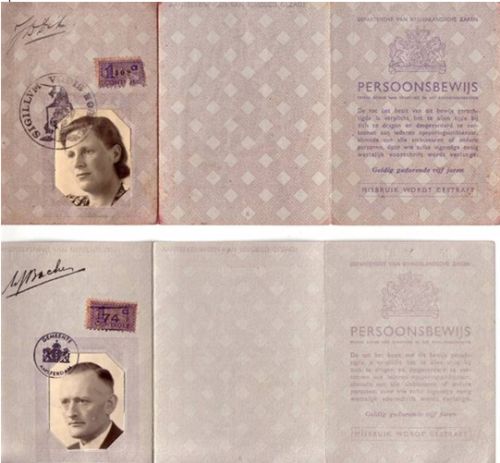
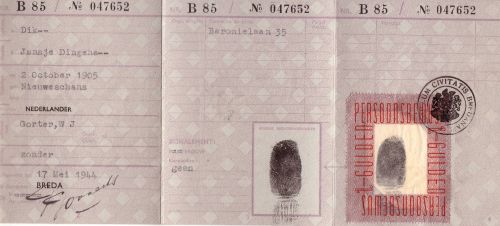
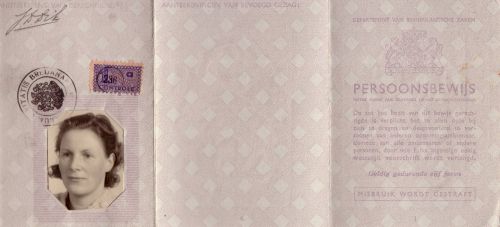
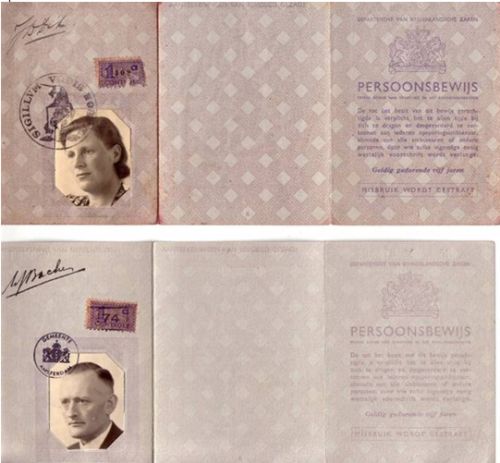
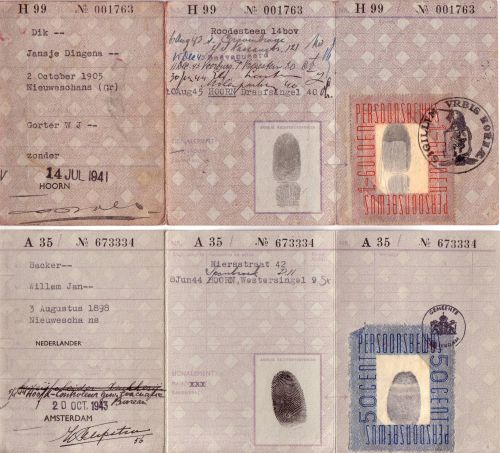
Since it was too dangerous to staying, or being seen together, most of the four years under German occupation, they stayed separated. Only a few times during these four years, they met; sometimes because of a larger “action” against the Germans. During on of those short meeting, the second daughter was conceived (Ellen Wilhelmina Gorter, born on October 17th, 1943).
Robert reported that his parents would not speak not too often about that period but it had always been clear to him, also as a small child that his parents had suffered greatly by this experience. Still, they would never express any hatred towards the Germans; repeatedly saying that not all Germans were evil and that one should learn from this and prevent any repetition in one form or the other. Often through old friends of Robert Gorter’s parents, he found out about their deeds during the German occupation, and they match what has been portrayed in movies like Schindler’s List. A niece of Robert Gorter’s mother, who was 19 years of age and extremely good-looking with her light-blue eyes and very fair blond hair, and also in the resistance, was captured by some Nazis while bicycling in Haarlem and was executed at the spot and her body left next to her bicycle in the street, three days before the official capitulation by the German army.
When the Allies freed the Netherlands in May of 1945, Robert’s mother was in a very a poor state of health (she had lost more than 20 kg and was completely starved and malnourished). Therefore, she was sent to Switzerland by the Red Cross to recuperate and get her strength back. She stayed there with her two children Rita and Ellen for almost a year. She stayed with a Jewish family, which had leased the municipal “Hallenbad” (indoor swimming pool). His first name was Dorius (meaning wisdom in Jewish). When later Robert was born, his third given name was Dorius, to honour the man who had helped them so much. Here, Rita went to school and learnt to speak Swiss German.
When Jansje and her two children returned to the Netherlands, they decided (as so many people in Europe) to pick up their lives again and make the best out of it. Robert Gorter was born as part of that new start for Willem Jacob and Jansje Gorter.
It took Robert Gorter’s parents ten years before they could handle emotionally to return to Germany and Austria. When Robert was nine years old, the whole family (father, mother, Rita, Ellen and Robert) went for a three week vacation to Radstadt, Tyrol, in Austria. It was the first time in his life Robert would see mountains, take walks in the Alps, see men in short leather pants and hear them “jodelen” and eat “Apfel Strudel.”
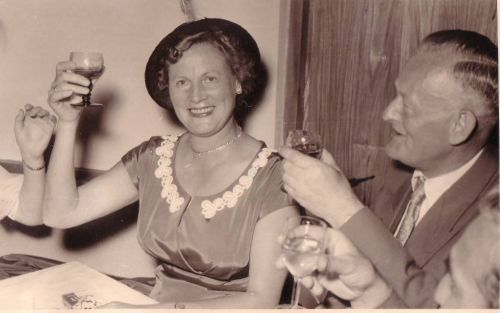
Robert Gorter’s parents at a cosy get-together with locals in Austria in 1955;
The very first time Robert Gorter’s parents went on vacation in Germany and Austria ten years
after the end of the second world war.